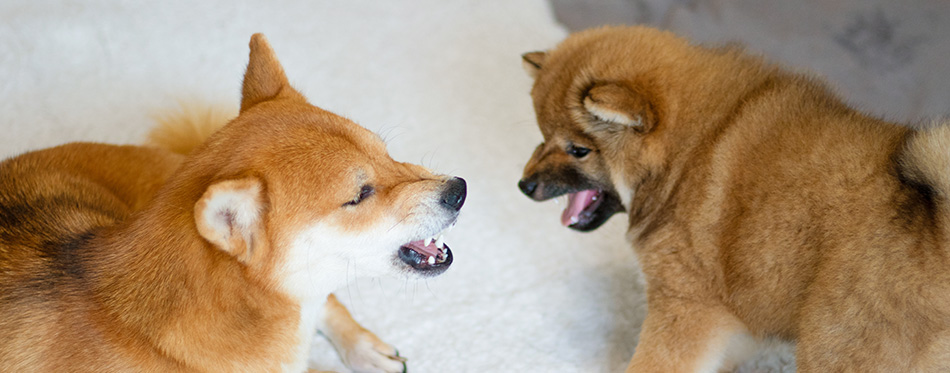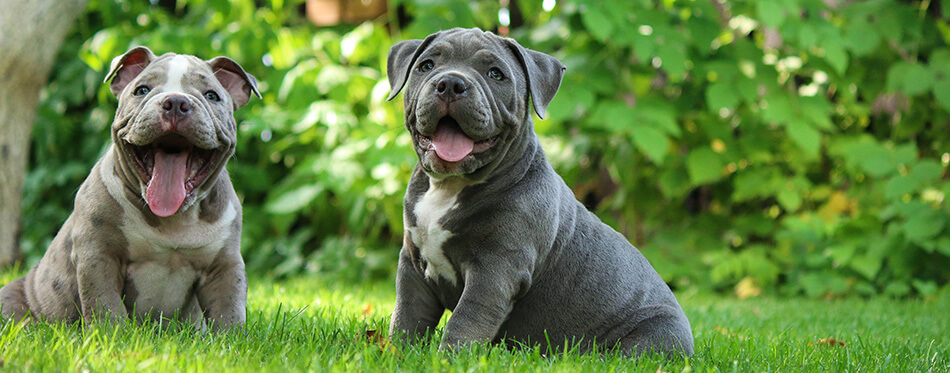When you bring a new puppy into your home one of the first things you need to prioritize in terms of training is socialization. Once a puppy has been fully vaccinated and is able to go outside and see other dogs, they should be introduced to others to familiarise them with their fellow canines. Puppy socialization can help to prevent a myriad of behavioral problems later down the line. If you’re unsure of the best approach to socializing your pup, don’t worry! We’ve listed all of the best ways to socialize a puppy below for you to choose from.
Takeaway Points
- Begin socializing a puppy as soon as it is able to safely leave the house.
- It is better to have dogs meet for the first time outside to avoid a confrontation.
- Puppies can be socialized in more ways than just taking a trip to the dog park.
- Adult dogs are harder to put through the socialization process than puppies.
- Additional care should be taken when socializing a rescue dog.
- Some dogs require professional training in order.

The Benefits of Socializing A Puppy
There are a few major reasons for socializing a puppy that will have a huge impact on the overall wellbeing and behavior of your puppy in the long run. Socializing can seem stressful to your pup to begin with, but its absolutely worth the effort and perseverance in the end, and here’s why:
Reduced Aggression
Early socialization is absolutely essential to prevent aggression when the dog gets older. Dogs are naturally cautious of others unless taught otherwise, much as many wild animals are. New puppies should be introduced to family members, fellow dogs, and other animals wherever possible once they are vaccinated in order to massively reduce the possibility of them becoming aggressive as adults.
Reduced Stress and Anxiety
Similarly to avoiding aggressive behavior – the naturally cautious behavior of dogs can also mean that in group settings they become overwhelmed or anxious if forced to socialize when they don’t want to. A more naturally confident dog might not be too bothered by these interactions, but many dog breeds (particularly smaller breeds that are more vulnerable) can find being around lots of people and other dogs difficult and exhausting.
Prevent Destructive Behavior
Destructive behavior can be the result of stress, anxiety, and aggression. It may only come out when the dog is in a situation it doesn’t like, or it may become a constant issue if left unchecked. Proper puppy socialization can help to lessen the possibility of this behavior coming to fruition.
Save Your Dog
If a dog develops aggressive behavior as a result of a lack of socialization, it can lead to them having to be surrendered to a rescue or shelter owing to the owner’s inability to handle the resulting behavioral problems. Sadly, if you don’t socialize your puppy correctly and have to surrender them, it is possible that otherwise healthy dogs could be euthanized if the shelter is incapable of rehabilitating them. Euthanization as a result of the behavioral problem is actually among the top three reasons for dog deaths alongside infectious disease.
The Puppy Socialization Process
The puppy socialization period begins the moment your new puppy is fully vaccinated and able to go out. It is the period in which you should try to introduce your puppy to as many people and other animals as possible. At this early age, they are especially susceptible to picking up behavioral cues both from their owners and from others. Socializing is a lifelong process, much like it is with humans. Your puppy will continuously learn new ways to interact when it begins to explore the outside world in more detail.
With an older dog, socializing can be a little more difficult, especially if they are a rescue coming from difficult circumstances. Many rescue dogs have an inbuilt wariness of others, though their history is often unknown. As a result, you have to take special care to socialize them in a stress-free way. This means introducing them to people they are most likely to meet on a regular basis first, before moving on to introducing them to other animals (these animals need to be calm so as not to startle them).
Patience and understanding are key in establishing a good flow with a rescue dog and a new puppy. Additionally, crate training can help them to feel safer as the crate will become their own space in which they can escape the outside world if it becomes overwhelming.
How to Socialize a Puppy
Before your start socializing your puppy, you may want to plan out how you’re going to go about it. Below we have listed some of the best ways to socialize your dog along with some small pointers on how to do it so as to minimize stress and anxiety.
Minimizing Stress
Most puppies and rescue dogs will likely find meeting other animals and people quite stimulating and perhaps even overwhelming. The main things to remember before getting and socializing a new dog are:
- Let them take it at their own pace – They may want to run away within a minute of meeting a new dog. Let them do this if it’s what makes them comfortable. Forcing them to interact will only stress them out further.
- Start small – Maybe start with a best friend or family member first before bringing in new animals. When you do it would be a good idea to bring in a docile pet that is unlikely to impose on your new dog and make them feel threatened.
- Be patient – Your dog will get to grips with interacting with others eventually, but pushing them and bullying them into doing it on your terms will likely have the opposite effect to what you intended.
- Know what to look out for –
Dog Parks
Dog parks are definitely one of the top places to be if you’re wanting to introduce your puppy to the big wide world of other dogs and their owners. For some puppies this can be a little bit overwhelming to start with, so don’t worry about doing a long walk. The mental stimulation of meeting so many dogs can be quite exhausting in itself for most puppies.
Dog Training Classes
A puppy class such as socialization classes or obedience training can be a great way to introduce multiple dogs to one another in a controlled setting. In these classes, you will be given the training tools needed to successfully socialize your dog with others as well as being overseen by a dog training professional. Though admittedly this is one of the more expensive socializing methods.
Puppy Daycare
Sometimes nicknamed “puppy kindergarten”, puppy daycare is literally made not only to make your life easier by looking after your pup when you’re unable to be home with them but also to encourage the puppies to play together and become familiar with one another. This is always an excellent start though it’s not always budget-friendly.
A Group Puppy Walk
Group dog walks are not only great for teaching your dog to interact, owing to it taking place in a neutral environment, but they can also have additional benefits such as teaching them recall when they get a bit older. Young dogs will follow the examples of older ones, and so if you put an unruly puppy in with a group of well-behaved adults, it will begin to imitate them – you can use this to your advantage.
Puppy Playdates
When puppies play together it teaches them boundaries, and how to communicate. Most animal behavior is learned in the first year or two of a dog’s life, so it is a good idea to begin that process as soon as possible. Puppy playdates have a lot of advantages when it comes to young dogs learning boundaries, though if you can arrange playdates with older dogs too, it can help them to learn how to understand authority.
The Vet Waiting Room
A trip to the vet’s office can give your dog the chance to meet with other puppies in a neutral environment indoors. If you see another puppy that appears eager to meet your pup this could be the perfect opportunity for your pooch to meet with other dogs in a relatively controlled environment. Though it’s also worth noting that the vets can be very stressful for some dogs, so be careful to read the other dog’s body language before approaching as they may be feeling tense and anxious.

Things to Avoid When Socializing Your Puppy
The socialization period is a delicate time for all pups, so remember to be patient and understanding. There are also a few things you should consider in terms of what you should avoid when you’re teaching your pup about others:
Avoid Unvaccinated Dogs
This is more for puppies that have not yet had their full vaccinations. You may know someone who has a dog and is eager for them to meet, but if that dog is not up to date on its vaccines it is best to keep them apart until your puppy is cleared. Additionally, you should avoid dog parks for this same reason.
Overly Enthusiastic Dogs
At least, to begin with, you should try to avoid introducing your pup to a dog if the other dog is particularly energetic. This can frighten your puppy and cause them to run away as opposed to approaching the other pooch. Once your dog’s confidence has grown you can look to gently introduce a more enthusiastic dog in a neutral setting.
Letting Your Dog Off The Lead
This one is more aimed towards older dogs, though young dogs can have trouble with recall so you may not want to let them off for that reason. With an older dog, there’s no way of knowing how they will react to other dogs, to begin with. Therefore, you should never let them off the lead when introducing them to others or in busy parks, as it could result in them lashing out or running away.
FAQs:
Q: Can you socialize older dogs?
A: An adult dog is certainly more difficult to socialize from scratch when compared to their younger counterparts, but that doesn’t mean it’s impossible. It simply means that you may need to exercise patience and perseverance in order to get positive results (also remember to use plenty of positive reinforcement to encourage a positive association with other unknown dogs).
Q: When to socialize puppy with other dogs?
A: Young puppies need to be socialized once they’ve had their final vaccinations and are able to go out and about. Throughout your dog’s life, they will come into contact with a wide variety of dogs, therefore the more varied their socialization is, the better off they will be as they get older.
Q: Why is puppy socialization important?
A: Socializing your puppy early can help to prevent a variety of behavioral problems such as destructiveness and aggression. Additionally, it can help to protect your dog’s mental health as properly socializing a new pup can help to prevent anxiety in group settings and keep them comfortable.

